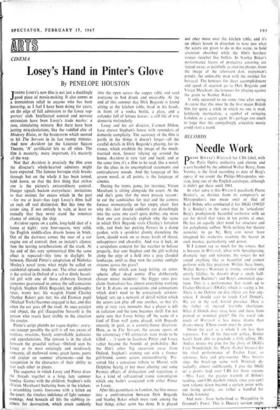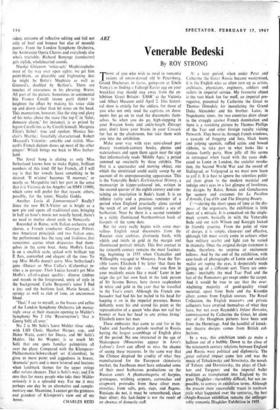Needle Work
RECORDS PIERKE BOLA I I's Wozzeck for CBS label, with the Paris Opera orchestra and chorus and a cast headed by the admired Walter Berry, from Vienna, is the third recording to date of Berg's opera if we count the Philips-Mitropoulos ver- sion,,Iong out of the English catalogue, although it didn't get there until 1961.
In what sense is this Wozzeck peculiarly Pierre Boulez's, as distinct from its composer's or
Mitropoulos's (no mean one) or that of Karl Bohm, who conducted it for DOG (1965)? It is Boulez's in the sense that he 'articulates' Berg's prodigiously beautiful orchestra with an ear for detail that takes in ten points at once. He has an equally alert mind for structure and for polyphonic onflow. With nothing but theatre acoustics to go by, Berg can never have imagined his orchestra reaching the hearer in such nuance, particularity and power.
If I cannot say as much for the voices, that is because in Wozzeck, what with Sprechgesang,
dramatic tugs and tensions, the voices do not sound anything like as beautiful and cannot perform with like precision. Within these limits,
Walter Berry's Wozzeck is strong, sensitive and utterly lifelike; hc doesn't drop a single half- tone from Buchner's and Berg's emotional spec- trum. This is a performance that stands up to Fischer-Dieskau's (DOG), which is saying a lot. There is no Doktor on disc (there arc few any-
where, I should say) to touch Carl Minch's.
We are in the real, horrid presence. Here is the father of myriad test-tube charlatans.
What if Diinch does stray here and there from printed or nominal pitch? On the vocal side much of Wozzeck is less music drama than drama-music. Elbow-room must be given.
About the cast as a whole I am less than rapturous. For all his free-rein policy, Boulez hasn't been able to preclude a little jelling. His Andres makes me pine for the glory of DGG's Fritz Wunderlich; his Marie (Isabel Strauss) for the rival performance of Evelyn Lear, so sensuous, fiery and pity-rousing. Miss Strauss sings the break-up scene with Wozzeck de- tachedly, almost indifferently. I give the DOG set a points lead over CBS for three reasons —Miss Lear; the greater warmth of Biihm's reading; and CBS decibels which, since you can't turn volume down beyond a certain point with- out losing quality, are rather a handful for fireside listening.
And now: Joan Sutherland as Marguerite in Gounod's Faust. This is Decca's version (eight
sides), outcome of reflective editing and full not only of beef and bounce but also of moonlit poetry. From the London Symphony Orchestra, the Ambrosian Opera Chorus and everybody else who's tractable, Richard Bonynge (conductor) gets stylish, wholehearted sounds.
Nicolai Ghiaurov 'voice-acts' Mephistopheles most of the way over open sights; we get him point-blank, so plausible and frightening that he might be Boito's Mephisto as well as Gounod's, doubled by Berlioz's. There are touches of coarseness in his phrasing. Bravo. All part of the picture. Sometimes in sentimental bits Franco Corelli (name part) thinks' to heighten the effect by making his voice slide up and down rather than hit notes on the head. This mannerism, however, like the ring and glory of his notes above the stave (the top C in `Salut, demeure chaste,' for instance), is as prized by legion Corelli-ites as by Corelli himself. Margreta Elkin's Siebel: true and opulent. Monica Sin- clair's Marthe: forcefully characterised. Robert Massard's Valentin : amiable and stylish. Mas- sard's French diction shows up most of the other singers'. Which brings me back to Miss Suther- land.
The Jewel Song is elating as only Miss Sutherland knows how to make flighty, brilliant numbers of this kind. Of her French, all I will say is that her vowels leave something to be desired. 'II m'aime' becomes 'H murmur,' or nearly so. Marguerite isn't her part in the sense that it is Victoria de los Angeles' on HMV (1960), which some will prefer for that reason; others, possibly, for the tenor, Nicolai Gedda.
Another Lucia di Lammermoor? Really? Since the new RCA-Victor set is bright as a new pin and opens all traditional cuts, bringing in half an hour's music not usually heard, there's no need to mutter about coals to Newcastle.
Recorded in Rome, with Italian orchestra and chorus. a French conductor (Georges Pretre), two American principals and two Italian ones, the performance has the tang and liveliness.rthat sometimes accrue when disparates find them- selves in the same boat. Anna Moffo's Lucia Is on a smallish scale, spiked with brilliant top E flats, controlled and elegant all the time To say Miss Moffo doesn't carry Miss Sutherland's guns (Dacca) or Miss Callas's (Columbia) in- vites a tu quo que. Their Lucias haven't got Miss Moffo's all-of-a-piece quality: diverse timbres and moods in the foreground, unity of style in the background. Carlo Bergonzi's tenor I find a joy; and the baritone lead, Mario Sereni, is springy as well as rich of tone, an uncommon blend.
'That,' I say to myself, as the basses and cellos of the London Symphony Orchestra jab menac- ingly away at their staccato opening to Mahler's Symphony No 2 (the 'Resurrection), 'that is Georg Solti all over.'
No 2 is Mr Solti's latest Mahler (four sides, with LSO Choir, Heather Harper, sop., and Helen Watts, cont.) for Decca, and Mr Solti's Mahler, like his Wagner, is so much Mr Solti that one spots familiar palmprints all over the place. Compared with the Klemperer- Philharinonia-Schwarzkopf set (Columbia), he gives us more point and jaggedness in brassy, 'dramatic' parts and is more leisured and luscious when landmark themes for the upper strings offer rubato chances. That is Solti's way; and I'm sure that for many people who take their Milder seriously it is a splendid way. For me it may perhaps one day be an alternative and comple- mentary one. Meantime, I cannot get the grimness and grandeur of Klemperer's view out of my






























 Previous page
Previous page